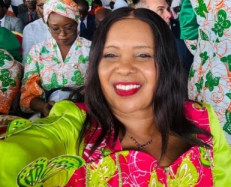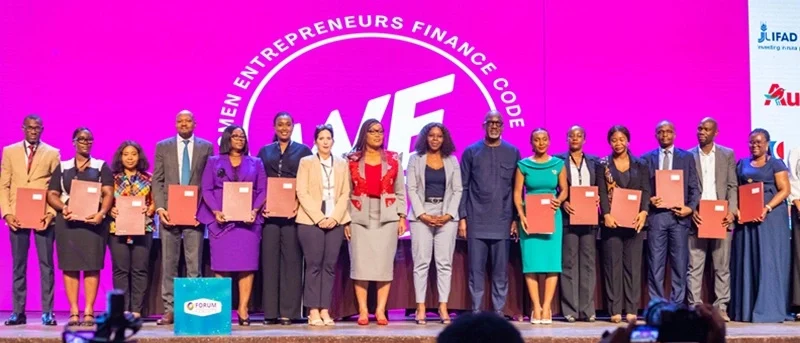Cote d’Ivoire is taking significant steps toward gender-inclusive finance in West Africa, driven by a bold question: how can we move beyond piecemeal solutions to achieve systemic change for women entrepreneurs?
The answer, in part, lies in the WE Finance Code, a global initiative launched by the Women Entrepreneurs Finance Initiative (We-Fi) to dismantle the systemic barriers women face in accessing capital. In Cote d’Ivoire, this voluntary commitment has proven to be more than a framework, it’s catalyzed a movement.

We spoke with Marie-Chantal Uwanyiligira, World Bank Country Director for Cote d’Ivoire, Benin, Guinea, and Togo, who has been at the forefront of this transformation. Her team, working closely with International Finance Corporation (IFC) and local stakeholders, has turned the Code into a rallying point and a springboard for innovation.
“The financial inclusion gap is widening instead of narrowing,” she said. “While the country is moving into the digital world, into access to digital finance, women are being left behind.”
The Gender Bond: From Commitment to Capital
Supported by the World Bank, the WE Finance Code was introduced in Cote d’Ivoire with seven financial institutions and eight financial ecosystem players as signatories, committing to its three core principles: appointing a senior champion for women’s financial inclusion, collecting and analyzing sex-disaggregated data, and taking action to better serve women-led businesses.
The Code’s impact quickly became evident. It brought together a group of banks committed to improving how they serve women-led businesses, creating new momentum across the financial sector. Ecobank, a national champion of the WE Finance Code and a long-standing leader in financing women entrepreneurs, further demonstrated its commitment by issuing Cote d’Ivoire’s first gender bond, a dedicated financial instrument to expand access to capital for women-led small and medium-sized enterprises (WSMEs).
IFC, through its Banking on Women program, anchored the bond with an investment that enabled Ecobank Cote d’Ivoire to provide nearly 1,200 loans to women-owned small and medium-sized enterprises (WMSMEs). The bond is expected to contribute to business growth, job creation, and narrowing the significant credit gap that women entrepreneurs face.
Other banks have since expressed interest in joining the initiative. “We started with Ecobank, but now you have other banks really interested to join,” Marie-Chantal noted.
Beyond Traditional Banks: Expanding the Ecosystem
Marie-Chantal was clear that the effort doesn’t stop with traditional financial institutions. The push for financial inclusion must also include digital banks, mobile money providers, and fintechs like Orange Bank, particularly as the digital divide threatens to leave women even further behind.
“It’s not only about access to finance, but it’s also the digital financial access,” she said.
Marie-Chantal also highlighted the need to set clear targets and rally stakeholders behind measurable goals, especially as Cote d’Ivoire pushes forward as a fast-track country under the World Bank’s Gender Strategy. The idea is to move from isolated projects to a portfolio-wide approach, embedding gender-lens finance into all areas of engagement.
“We can actually embed it (the WE Finance Code) in the portfolio and have a portfolio approach across the Bank,” she said. “And we already work here as one World Bank Group—that makes a big difference.”
Girls Learn, Women Earn: Linking Education, Inclusion, and Impact
Marie-Chantal also introduced a new initiative being launched in partnership with the Cote d’Ivoire First Lady’s foundation: “Girls Learn, Women Earn.” The program rests on three pillars: keeping girls in school, promoting women’s entrepreneurship and financial inclusion, and removing obstacles such as gender-based violence.
It builds on the foundation’s already impressive record, including loans to over 2 million women, with a repayment rate of 98%.
“Once a woman has an income, then she is empowered,” she said. “Then you can do so many things.”
The initiative will integrate efforts like the gender bond and the WE Finance Code under a broader national strategy, one that involves traditional banks, microfinance institutions, and mobile banking platforms, working together to close the gender finance gap.
A Platform for Systemic Change
As Marie-Chantal explained, the WE Finance Code isn’t just a policy tool, it’s a platform for coordination, experimentation, and accountability. “We really tried to start from the problem we’re trying to solve,” she noted. “We wanted to make sure we could rally partners in the financial sector—and that’s where the WE Finance Code was really critical.”
The path from commitment to capital is clear. And in Cote d’Ivoire, it’s already well underway.
With thanks to Maria Pagura for her invaluable input and collaboration.

